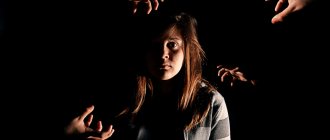Social phobias include a whole group of phobias associated with public actions or communication. This could be a fear of speaking or other situations where a person is the center of attention, a fear of large crowds of people, fears associated with public evaluation, which include the fear of looking ridiculous or funny.
A person may be afraid of attention from other people, for example, experience severe discomfort in cases where they have to use a public toilet or eat in the company of other people. Social phobia can also manifest as excessive shyness when interacting with strangers or people of the opposite sex.
Social phobia is an anxiety disorder. If a person finds himself in a frightening situation, symptoms such as sweating, rapid heartbeat, flushing of the face, difficulty breathing, etc. may be observed.
When does social phobia develop?
Most often, a phobia begins to form in adolescence or adolescence, when the child faces various social difficulties. Teenagers are very dependent on public opinion. During this period, the fear of “being different from everyone else” intensifies, a craving for communication with the opposite sex appears, and with it the fear of being rejected. Public activities (reports, speeches, etc.) give rise to the fear of being worse than everyone else, of seeming funny, stupid or ridiculous. If the situation is unfavorable for the child, then fears are reinforced and transferred into adulthood.
Unfortunately, many people simply have not heard of such a disease as social phobia. They explain their conditions by excessive shyness and personal characteristics.
Why is social phobia dangerous?
If social phobia is not treated, the patient’s condition may worsen over the years, leading to serious impairments in social adaptation, including loss of ability to work. Social phobia is often accompanied by depression and decreased self-esteem. People suffering from social phobias often seek solace in alcohol or drugs, and cases of eating disorders are common. Social phobia, especially in combination with other mental disorders, leads to complete isolation of a person and increases the risk of suicide attempts.
In 90% of cases, social phobia is cured using various psychotherapeutic methods.
If necessary, along with psychotherapy, medications are used. You shouldn’t self-medicate or give up - just make an appointment with a specialist .
A psychotherapist will help you cope with your problem and select effective treatment methods. You will definitely cope with your fears and gain self-confidence.
Social phobia: how to get rid of social fear?
PsychologySocialphobiaPhobia
Social phobia is strong, persistent, unreasonable fear and anxiety of various social situations: situations of communicating with other people, meeting other people, the need to speak, speak publicly, etc. More precisely, strong anxiety and fear of evaluation, observation, careful examination of oneself by other people when performing some social action.
Social phobia is on a par with other phobias, but since its influence on people’s lives is quite strong, it needs to be considered separately. In this article I will talk about the symptoms of social phobia, the causes of social phobia, and the existing modern methods of treating social phobia, how social phobia can be dealt with. Let's start with the last one.
Treatment methods for social phobia
There are 4 possible treatments for social phobia:
- Personal (individual) psychotherapy.
- Group psychotherapy.
- Psychotherapy online, psychotherapy from books, you can also add self-help here.
- Medicines.
I will not consider all possible variations of psychotherapeutic treatment. They undoubtedly exist in any direction of psychotherapy that exists in science today. In this article I talk only about cognitive and cognitive-behavioral psychotherapy for social phobia, because that’s what I do, that interests me, and that’s what I’m good at.
| Personal psychotherapy | Group psychotherapy |
| Work one-on-one with a psychologist All attention - only to your case Cognitive-behavioral psychotherapy Weekly, approximately 3 months Read more → | Work in a group of 4-6 people Attention is paid to other cases Cognitive-behavioral psychotherapy Weekly, 12 sessions Read more → |
Symptoms of social phobia
Social phobia comes in a variety of forms and variants, and the degree of its intensity and the degree of its impact on the quality of life vary. But all these options have one thing in common: a persistent and noticeable fear of situations when you are forced to face one or another form of public speaking, talking with people, or face one or another form of evaluation of you by other people. This fear is accompanied by the fear of being publicly humiliated, embarrassed, disgraced, looking bad, etc. This is symptom number one.
- Symptom number two: if such a situation does happen, then with a high probability, before, after or during the situation, severe anxiety arises, up to a panic attack.
- Symptom number three: the fear is actually excessive or unreasonable.
- Symptom number four: avoidance behavior is taking place, that is, the person is somehow trying in every possible way to avoid getting into such a situation, and if it doesn’t work out, then he experiences intense stress with anxiety.
- Symptom number five: all of the above significantly affects normal life, work, classes, studies, communication with other people, etc.
- Symptom number six: all of the above occurs in an individual over 18 years of age and lasts for at least six months.
That is: if someone avoids communicating with people because they irritate him terribly, and not at all because he becomes very anxious in their presence, this is not social phobia. If someone is nervous when they have to give a presentation in front of colleagues at work, but this nervous anxiety does not cause any particular problems and does not lead to a refusal to speak, this is not social phobia.
It's completely normal to worry that other people might not approve of you.
Social phobia can be specific: someone is afraid of public speaking in front of an unfamiliar audience, someone worries only when visiting restaurants or using other public places, someone worries when they write something and are being watched, someone is normal speaks in front of close and familiar people, but not etc. Other variants of social phobia can be generalized, in which case they include fear of a wider range of social situations: meeting new people, the inability to refuse others, difficulties with making and attending dates, etc. .P. However, whether with a specific type of social phobia or a generalized one, as a rule, there is always some degree of fear of public speaking.
Almost every person has such fears from time to time, and even such famous actors as Bruce Willis, Tom Cruise and others admitted that they have certain social fears.
There is a time-tested test for social phobia - the Liebowitz (Leibowitz) Scale - to assess the symptoms of social phobia, you can take it now (opens in a separate window).
Modern theories of social phobia emphasize the role of thinking and thought processes in the formation and maintenance of social phobia:
- Firstly, with social phobia there are well-defined typical beliefs and ideas that contribute to the development of social anxiety, and well-defined anxious thinking styles.
- Secondly, when a person with social phobia comes into contact with other people (or in some social situation), he tends to focus as much as possible on his internal sensations. Because of this overly attentive observation of one's reactions, a person becomes overly sensitive to the slightest changes in his inner fear or anxiety, exaggerating its degree and significance, as a result of which an incorrect image of himself is formed.
- Third, people with social phobia consistently engage in a variety of so-called “safety or defensive behaviors,” which allows them to reduce the risk of negative evaluation from others. There is very frequent avoidance of situations in whole or in part.
- Fourthly, they exaggerate how negatively others actually evaluate them, do not have certain behavioral skills, and tend to overestimate other people’s reactions to their behavior to their disadvantage.
- Fifth, before and after a social situation, people with social anxiety ruminate excessively about the situation, focusing on past failures, self-deprecating thoughts about themselves, and negative predictions for the future.
All these nuances are “processed” by the thinking of such a person in the smallest detail, and therefore are permanently fixed in memory, resulting in a “vicious circle”: social phobia “feeds itself.”
If you have the above symptoms, and you scored 30 points or more on the Liebowitz Scale, then read on. Perhaps this information is just for you.
Causes of social phobia
According to researchers, up to 12% of the world's population suffers from social phobia in one form or another, and approximately equally, both men and women. Scientific psychologists of various directions have long been trying to determine what can cause social phobia, but the cognitive-behavioral model of social phobia has received the most widespread and scientific substantiation. Accordingly, within the framework of the same model, the most effective methods of overcoming social phobia have been developed.
As a rule, generalized social phobia arises quite early in childhood (average age - 10.5 years, according to Manuzza et al., 1995), and specific social phobia arises later - on average at the age of 16.9 years.
So far there has not been a single scientific confirmation that it is the unsuccessful experience of public speaking that plays a significant role in the formation of social phobia. For example, Steinberg et al. examined 22 people with generalized social phobia, 16 people with specific social phobia, and 25 people without social phobia, asking them whether they had any experience of traumatic social interaction (for example, an objectively very bad public speaking experience). According to the results of this study, half of the subjects with generalized social phobia, 40% of the subjects with specific social phobia, ... and 20% of healthy subjects had such psychological trauma! According to other studies (Öst, Hugdahl), only 15% of those who had traumatic experiences developed social phobia.
It is believed that social phobia is most likely related to a person's innate ability to easily associate fear with angry, critical or rejecting faces of other people, or with direct eye-to-eye gaze, especially if the faces are directed towards the person rather than away from them. This hypothesis is confirmed by research by Öst & Lundh, where it was found that subjects with social phobia tend to interpret different photographs of human faces much more quickly and easily as aggressive or critical, rather than as approving and supportive. That is, there is an initial tendency to evaluate others as critical (while they may be neutral).
Heredity also plays a certain role in the occurrence of social phobia. People are three times more likely to develop social phobia if they have a family member with social phobia. One twin has a 15% to 24% chance of developing social phobia if the other twin develops social phobia.
Early precursors of social phobia are shyness, which is inherited genetically, and a kind of “suppression behavior” in childhood: avoidance of contact, avoidance, fear of unfamiliar people and situations, overexcitation of the sympathetic nervous system, which is responsible for controlling breathing, pulse, and other physiological reactions.
Results of cognitive behavioral therapy for social phobia
Well, finally, we got to the most interesting thing: how does social phobia treatment occur in such a “miraculous” way in cognitive behavioral therapy (in any format: group, individual format) that its effectiveness is equal to the effectiveness of medication?
Various details and scientific justifications are presented in the relevant professional literature, here I will tell you in general. The essence of this therapy is that each participant is given individual opportunities to learn and understand that in fact social situations are not so frightening, their mistakes do not look so terrible, and their inability to behave can be corrected. Over the course of session after session, the therapist encourages these opportunities to be explored, ensures that the information is assessed and processed correctly, and provides support and encouragement to participants to become active in improving their lives. As therapy progresses, the effects extend into the long term because participants learn to be their own therapists, trying different skills after therapy ends.
The first part of therapy is devoted to informing, explaining why social phobia exists, what supports it; the second part is actually a variety of exercises aimed at getting rid of social phobia, and the third part is devoted to preventing relapses and consolidating acquired knowledge and skills.
The main gains after cognitive behavioral psychotherapy can be described as follows:
- skills of behavior in social situations are acquired;
- there is a chance to allow anxiety to “melt away” on its own and naturally;
- a chance to become calmer in social situations, and stop considering social phobia a nightmare of a lifetime;
- self-learning and self-instruction skills for the future are acquired.
A few words about the treatment of social phobia with medications
Drug treatment for social phobia is also possible. Currently, the most common prescribed drugs are: serotonin reuptake inhibitors, MAO inhibitors, benzodiazepines, tricyclics and other antidepressants and beta blockers. In the United States, only some SSRIs (selective serotonin reuptake inhibitors) are approved for use for social phobia. Other types of medications, especially benzodiazepines and beta blockers, have not been proven to be effective. In addition, there is a danger of addiction to benzodiazepines.
In this article, I am not going to discuss in detail the effectiveness and differences in the use of these drugs; for prescription medications, please contact your doctor, psychiatrist or psychotherapist. For me as a consulting psychologist, it is important that the effectiveness of medications is almost the same as the effectiveness of cognitive behavioral psychotherapy.
Provided by SendPulse










